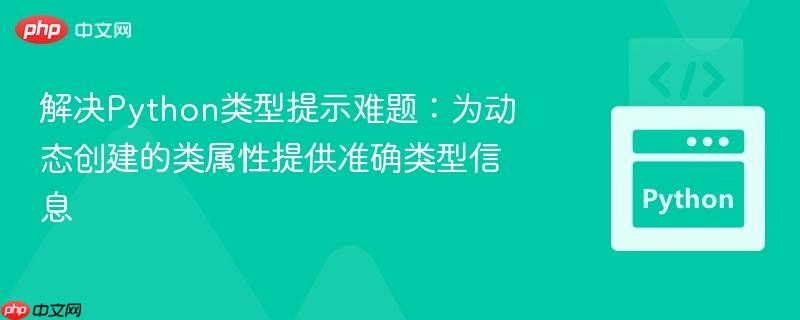
本文旨在解决在Python中使用工厂方法动态创建类属性时,类型提示丢失的问题。通过自定义泛型Property类,并结合类型注解,我们能够为这些动态生成的属性提供准确的类型信息,从而提升代码的可读性和可维护性,并充分利用类型检查工具的优势。
在Python中,使用property装饰器可以方便地创建类属性,并控制对属性的访问。然而,当需要动态创建具有相似结构的属性时,使用工厂方法可以减少代码重复。但这种方式会导致类型提示丢失,使得类型检查工具无法正确识别属性的类型。本文将介绍一种通过自定义泛型Property类来解决此问题的方法,从而为动态创建的类属性提供准确的类型信息。
考虑以下场景:我们需要创建一个接口类,其中包含多个结构相似的属性,这些属性通过property装饰器隐藏了getter和setter方法。为了减少代码重复,我们使用工厂方法来创建这些属性:
from __future__ import annotations
class Interface:
def property_factory(name: str) -> property:
"""Create a property depending on the name."""
@property
def _complex_property(self: Interface) -> str:
# Do something complex with the provided name
return name
@_complex_property.setter
def _complex_property(self: Interface, _: str):
pass
return _complex_property
foo = property_factory("foo") # Works just like an actual property
bar = property_factory("bar")
def main():
interface = Interface()
interface.foo # Is of type '(variable) foo: Any' instead of '(property) foo: str'
if __name__ == "__main__":
main()在这个例子中,Interface.foo和Interface.bar的类型被标记为Any,而不是预期的str。这会导致类型检查工具无法正确识别属性的类型,从而影响代码的可读性和可维护性。
立即学习“Python免费学习笔记(深入)”;
为了解决这个问题,我们可以自定义一个泛型Property类,并将其作为property的子类。这个泛型类可以接受两个类型参数:I表示外部实例的类型,T表示属性的返回类型。
from typing import Any, Generic, TypeVar, overload, cast, Callable
T = TypeVar('T') # The return type
I = TypeVar('I') # The outer instance's type
class Property(property, Generic[I, T]):
def __init__(
self,
fget: Callable[[I], T] | None = None,
fset: Callable[[I, T], None] | None = None,
fdel: Callable[[I], None] | None = None,
doc: str | None = None
) -> None:
super().__init__(fget, fset, fdel, doc)
@overload
def __get__(self, instance: None, owner: type[I] | None = None) -> Callable[[I], T]:
...
@overload
def __get__(self, instance: I, owner: type[I] | None = None) -> T:
...
def __get__(self, instance: I | None, owner: type[I] | None = None) -> Callable[[I], T] | T:
return cast(Callable[[I], T] | T, super().__get__(instance, owner))
def __set__(self, instance: I, value: T) -> None:
super().__set__(instance, value)
def __delete__(self, instance: I) -> None:
super().__delete__(instance)在这个自定义的Property类中,我们重写了__get__、__set__和__delete__方法,并添加了类型提示。这使得类型检查工具能够正确识别属性的类型。
有了泛型Property类,我们可以修改原始的设计,使用它来创建属性:
from collections.abc import Callable
Getter = Callable[['Interface'], str]
Setter = Callable[['Interface', str], None]
def complex_property(name: str) -> tuple[Getter, Setter]:
def _getter(self: Interface) -> str:
...
def _setter(self: Interface, value: str) -> None:
...
return _getter, _setter
class Interface:
foo = Property(*complex_property("foo"))或者,也可以直接在property_factory中使用泛型Property类:
def property_factory(name: str) -> Property[Interface, str]:
"""Create a property depending on the name."""
@property
def _complex_property(self: Interface) -> str:
# Do something complex with the provided name
return name
@_complex_property.setter
def _complex_property(self: Interface, _: str):
pass
return Property(_complex_property)
foo = property_factory("foo")使用类型检查工具(如mypy或pyright)可以验证我们的解决方案是否有效:
reveal_type(Interface.foo) # mypy => (Interface) -> str
# pyright => (Interface) -> str
reveal_type(instance.foo) # mypy + pyright => str
instance.foo = 42 # mypy => error: Incompatible types in assignment
# pyright => error: "Literal[42]" is incompatible with "str" ('foo' is underlined)
instance.foo = 'lorem' # mypy + pyright => fine从结果可以看出,Interface.foo和instance.foo的类型已经被正确识别为str,并且类型检查工具能够检测到类型不匹配的赋值操作。
通过自定义泛型Property类,我们可以为动态创建的类属性提供准确的类型信息,从而解决类型提示丢失的问题。这种方法可以提高代码的可读性和可维护性,并充分利用类型检查工具的优势。在实际开发中,可以根据具体的需求,进一步扩展和优化这个泛型Property类,以满足更复杂的场景。需要注意的是,使用类型提示并不能改变Python的动态类型特性,而是在静态分析阶段提供类型信息,帮助开发者及早发现潜在的类型错误。
以上就是解决Python类型提示难题:为动态创建的类属性提供准确类型信息的详细内容,更多请关注php中文网其它相关文章!

每个人都需要一台速度更快、更稳定的 PC。随着时间的推移,垃圾文件、旧注册表数据和不必要的后台进程会占用资源并降低性能。幸运的是,许多工具可以让 Windows 保持平稳运行。

Copyright 2014-2025 https://www.php.cn/ All Rights Reserved | php.cn | 湘ICP备2023035733号